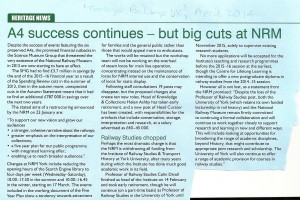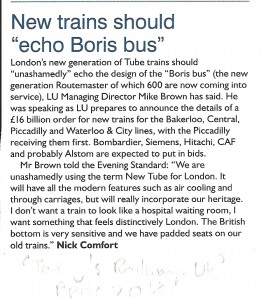The Times, Kaya Burgess, 24 May 2014.
Struggling high streets should do away with car parking spaces and replace them with pedestrianised zones, cycle lanes and bike racks to boost business, according to transport experts.
Mary Portas, the retail expert, recommended in 2011 that cheaper car parking was key to reviving the high street. Chris Boardman, the former Olympic cycling champion and policy adviser to British Cycling, disagreed yesterday, offering instead a “counter-intuitive” solution.
“It is well evidenced that replacing car parking with cycle access or pedestrianised zones doesn’t hurt business,” Boardman said. “Stats show cyclists spend less per visit, but they visit more often.”
British Cycling said: “Evaluations of pedestrian improvements in Coventry and Bristol show a 25 per cent increase in footfall on Saturdays and predict £1.4 million in benefits respectively.”
Boardman said that retailers should be shown how the number of shoppers can be boosted by moving car parking spaces off streets to nearby car parks.
The addition of protected cycle lanes on 9th Avenue in New York led to a 49 per cent increase in retail sales, compared to a 3 per cent uplift for shops on other local streets.
He explained: “New York used paint and planters to mark out cycle lanes for a six month trial, which didn’t cost much, and told local retailers if they didn’t like it, they would remove it.”
The Times accompanied Boardman yesterday as he took his local MP for West Wirral, Esther McVey, on a cycle tour.
Martin Key, of British Cycling, said: “Shops tend to over-estimate how many people drive to them. And you can have 10 bike spaces for each parking space.”
Adrian Lord, an infrastructure expert, said: “Those who arrive at high streets on foot or by bike tend to spend more, over time. This is especially true of local shops rather than big supermarkets. With cars, people are often looking at their watches because they have only 10 minutes left on the meter.”
Eric Pickles, the Communities Secretary, last year criticised some councils for having an “anti-car dogma”. Boardman said: “It isn’t ‘anti-car’ it’s ‘pro-people’.”
In West Kirby, Boardman’s home town, he wants to remove car parking on The Crescent, a parade of shops, and create a pedestrianised zone with cycle parking for a six month trial. It would cost £12,000.
Andrew Smith, a butcher at AI Roberts, said: “It would be perfect. It would bring more people in. Restaurants could have tables outside. People are scared of change, but they would adapt.”
Nicola Hulley, who runs a clothes shop, said: “It would be good for business, though we would need to be able to unload our stock.”
McVey, the local Conservative MP, said there would need to be car parking for elderly or disabled people and that such schemes need consultation and advanced warning.
“You wouldn’t want someone to go to the butchers and all of a sudden realise they can’t park outside, so they drive up the road to a supermarket,” she said. “People have to know in advance, have a trial period and, if it does work, that would be brilliant as it would work for everybody.”


 A South Wales Transport AEC Renown single decker bus turns into High Street from Alexandra Road in 1950.
A South Wales Transport AEC Renown single decker bus turns into High Street from Alexandra Road in 1950. Swansea Bus Museum was hoping to move its premises to Clarence Street, but the council is proposing to demolish the building.
Swansea Bus Museum was hoping to move its premises to Clarence Street, but the council is proposing to demolish the building. The old and the new in Oxford Street, mid-1950s. The buildings behind this United Welsh double decker bus represent post-war Swansea rising from the ashes of wartime bombardment.
The old and the new in Oxford Street, mid-1950s. The buildings behind this United Welsh double decker bus represent post-war Swansea rising from the ashes of wartime bombardment.
